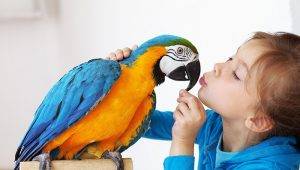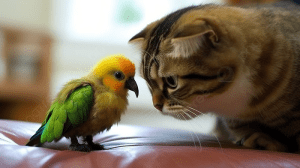Pet birds are cherished members of countless households around the world. Their colorful plumage, melodic songs, and lively personalities bring joy and companionship to their owners. However, ensuring the health and safety of these avian companions requires knowledge and vigilance. There are several common household items, foods, and situations that can be fatal to your pet bird. In this comprehensive guide, we’ll explore the top 10 things that can pose a serious threat to your feathered friend and how to protect them.
Toxic Foods and Plants
One of the most significant risks to pet birds is the ingestion of toxic foods and plants. Certain human foods can be fatal to birds due to their sensitive digestive systems. Avocado, chocolate, caffeine, alcohol, and high-salt foods are some of the culprits. Additionally, many houseplants are toxic to birds, including philodendron, poinsettia, and oleander. Always research and ensure that any food or plant you introduce into your bird’s environment is safe for them.
Non-Stick Cookware
Non-stick cookware coated with polytetrafluoroethylene (PTFE) or similar chemicals can release toxic fumes when overheated. These fumes, known as polymer fume fever or “Teflon poisoning,” can quickly prove fatal to birds. Ensure that your pet bird is not exposed to cooking fumes and that you use bird-safe cookware.
Inadequate Diet
A poor diet can have long-term health consequences for your pet bird and may eventually prove fatal. Birds require a balanced diet consisting of pellets, fresh fruits, vegetables, and some seeds or nuts, depending on their species. Feeding an imbalanced or seed-only diet can lead to malnutrition and health issues.
Lead and Zinc Poisoning
Birds are highly susceptible to heavy metal poisoning, particularly lead and zinc. Ingesting even small amounts of lead or zinc from items like contaminated toys, cage hardware, or old paint can lead to severe health problems or death. Ensure that your bird’s environment is free of such hazards.
Inadequate Hygiene
Poor hygiene in your bird’s cage and living area can lead to bacterial or fungal infections that may prove fatal if left untreated. Regularly clean your bird’s cage, dishes, and perches, and provide them with fresh water daily. Pay attention to any changes in their droppings or behavior, as these can be indicators of health issues.
Neglecting Mental Stimulation
Boredom and loneliness can have serious consequences for pet birds. Birds are intelligent and social creatures that need mental stimulation and interaction with their owners. Neglecting their mental and emotional needs can lead to depression and behavioral issues, which, if left unaddressed, can affect their overall health.
Inadequate Veterinary Care
Regular check-ups with an avian veterinarian are crucial for monitoring your bird’s health. Delaying or neglecting veterinary care can result in undetected illnesses or conditions that may become fatal. Be proactive in seeking medical attention if you notice any signs of illness or discomfort in your bird.
Overweight and Obesity
Overfeeding and lack of exercise can lead to obesity in pet birds, which can have serious health implications. Obesity can strain the heart, liver, and other organs and lead to a reduced lifespan. Ensure that your bird gets regular exercise and a balanced diet to maintain a healthy weight.
Neglecting Environmental Enrichment
Birds thrive in environments that provide mental and physical stimulation. Neglecting environmental enrichment can lead to stress and boredom, which can manifest as feather picking, aggression, or other harmful behaviors. Providing toys, puzzles, and a stimulating living area is essential for their well-being.
Lack of Emergency Preparedness
In the event of an accident, illness, or natural disaster, being unprepared can be fatal for your bird. It’s crucial to have an emergency plan in place, including knowing the location of an avian vet, having necessary supplies on hand, and knowing how to safely transport your bird in case of evacuation.
That Can Be Fatal to Your Pet Bird
Now that we’ve identified the top 10 things that can be fatal to your pet bird, let’s explore how you can protect them:
- Educate Yourself: Research and educate yourself about the specific needs and potential risks associated with your bird’s species. Different types of birds have unique dietary, environmental, and health requirements.
- Avian Veterinarian: Establish a relationship with an avian veterinarian who specializes in bird care. Regular check-ups and immediate attention to health concerns are essential.
- Safe Environment: Ensure that your bird’s living area is free from hazards like toxic plants, lead, and zinc. Use bird-safe cleaning products, and avoid exposing your bird to household chemicals.
- Balanced Diet: Provide a balanced and species-appropriate diet for your bird. Consult with your veterinarian to create a diet plan tailored to their specific needs.
- Environmental Enrichment: Create a stimulating environment for your bird with toys, perches, and activities that engage their physical and mental faculties.
- Regular Cleaning: Maintain good hygiene in your bird’s cage and living area to prevent infections and illness.
- Emergency Plan: Have an emergency plan in place, including knowledge of the nearest avian veterinarian, emergency contact numbers, and a well-equipped first-aid kit for birds.
- Social Interaction: Spend quality time with your bird, providing mental stimulation and social interaction to prevent loneliness and depression.
- Avoid Stress: Minimize stressful situations and changes in your bird’s environment. Birds are creatures of habit and can be sensitive to disruptions.
- Training: Train your bird with positive reinforcement techniques to ensure their safety and cooperation during medical examinations or emergencies.
Related Post:
Cracking the Cayuga Duck Egg Mystery: Unveiling the Secrets of Cayuga Duck Eggs
Exploring Duck-Chicken Compatibility: Can They Coexist?
Unraveling the Complex World of Aggressive Male Duck Behavior
In conclusion, being a responsible pet bird owner involves understanding and mitigating the potential risks that can be fatal to your feathered friend. Educate yourself, provide a safe and stimulating environment, and prioritize their physical and emotional well-being. By taking these precautions and being prepared, you can ensure a long, healthy, and happy life for your beloved pet bird.




